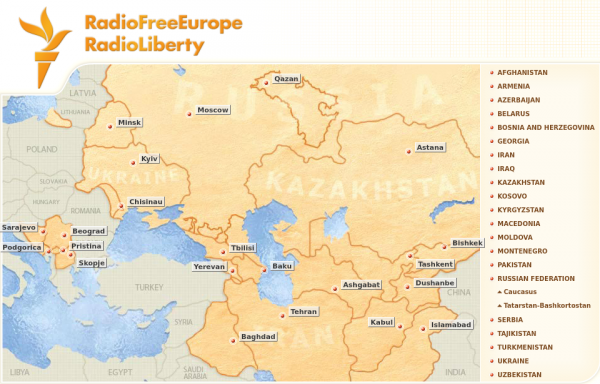
Radio Free Europe: free media (and languages) in unfree societies
What means of communication is more natural than language? Speaking your own mother language makes you feel comfortable and gives the possibility to fully express yourself. In a utopian society everybody could speak his own language without any restriction. In such an idealistic world, promoting languages through radio broadcasting might seem the most natural thing to do.
Indeed no media is more immediate and direct than radio when it comes to spreading the language, as even illiterates are able of understanding its message. Nevertheless, there is something that a non-utopian and realistic world has to deal with and that makes the natural tendency to speak his own mother tongue problematic. Language has been given an ideological and political meaning. Languages have been involved in the construction of peoples’ identity for ages and since XVIIIth century in particular they’ve been used as fundaments of the construction of the nation.
As a consequence, language has become a strong means of power, being censorship the ultimate weapon against those languages which don’t represent the dominant ethnical group within a nation. In this context it is possible to collocate the establishment of Radio Free Europe/Radio Liberty (RFE/RL – official website) at the beginning of the Cold War to transmit uncensored news and information to audiences behind the Iron Curtain. Founded in 1950, Radio Free Europe was funded principally by the U.S. Congress in order to broadcast to those country where communism was censoring and filtering the news.

However, even after the collapse of Communism Radio Free Europe didn’t stop its broadcasting, despite some thought RFE/RL had fulfilled its mission. The need for RFE/RL uncensored information was still a mutual concern and the words of Czech President Vaclav Havel are significant to understand the Radio relevance: “we need your professionalism and your ability to see events from a broad perspective.” Since 1991 Radio Free Europe has broadened its horizons and has reached new audiences. Today it broadcasts to 23 countries in 28 languages, including Iran, Afghanistan, Pakistan, Ukraine, and Russia.

Not only does RFE/RL journalists fight for information freedom, but also they provide news in peoples’ native languages whereas the government media lack information in those languages. Radio Free Europe gives a voice to those languages which are underrated because of their minority position within the states.
In order to understand its relevance, we might highlight the case of Radio Azatliq, the Tatar-Bashkir section of RFE/RL. In facts, even though Tatarstan and Bashkortostan are autonomous republics (belonging to Russian Federation), Azatliq, with its headquarters in Prague, is the only major international broadcaster for the Tatar and Bashkir communities in Russia, where the government on the contrary seems to limit ethnic minorities’ language rights. And it’s even more surprising to find out that Radio Azatliq content is used to teach the Tatar language to students, as the language used by the broadcasting service is modern and the topics relevant.

If Free Media in Unfree Societies well summarizes Radio Free Europe/Radio Liberty spirit and aim, we are not afraid to say that defending and promoting native languages is definitely part of its noble mission as well.
Azatliq, Bashkortostan, featured, language, lingua madre, Lingua1, mothertongue, nation, native language, Radio Free Europe, Radio Liberty, Tatarstan